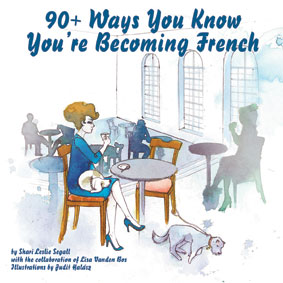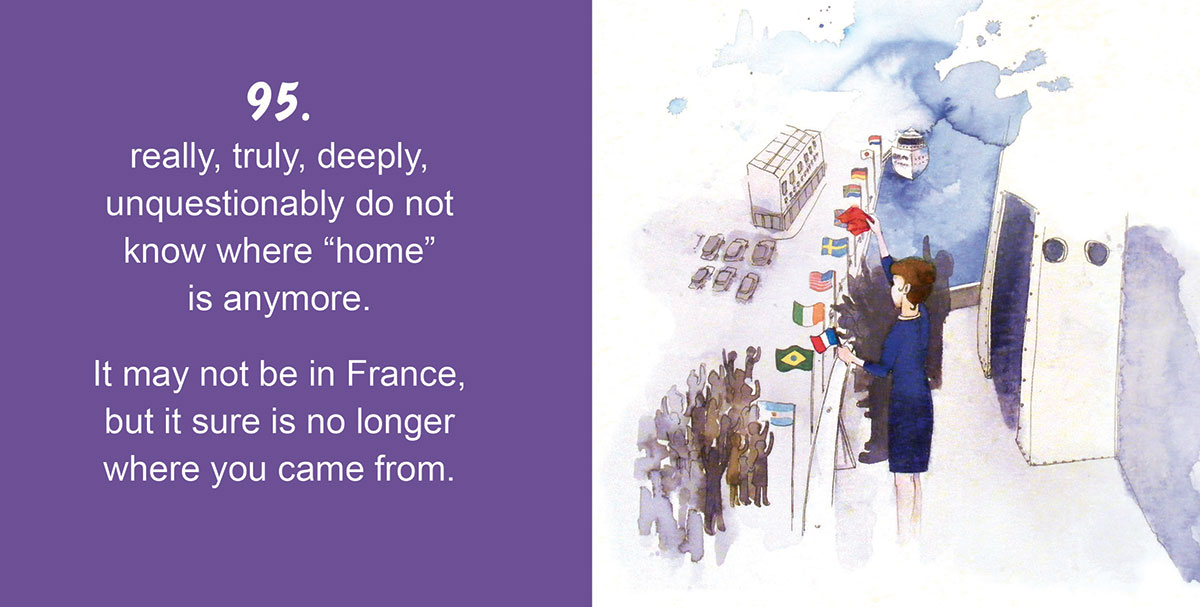FUSAC: You two created 90+ Ways You Know You’re Becoming French, a very popular book that grew out of Shari’s article on the same subject. You have since received, read, listened to, overheard, gathered “becoming French” examples from countless non-native Francophiles, including residents of France, would-be residents, tourists, language teachers, students wishing never to leave, culture mavens and many people who have battled it out with each other in our comments section as to who has racked up more Becoming French badges of honor. But wait! What about YOU? You’ve both been here since the 1980s. It’s Turn the Tables Time! What are several ways that YOU know YOU’ve “become French”? (Or not?)
HAVE NOT BECOME…
Shari Leslie Segall: They say that one’s “formative years” end at the age of two–that after merely twenty-four short months on this earthly orb, you already are who you’re gonna be. I don’t know if that’s true, but I do know that, since my father was a musician who needed to be at the Academy of Music at 7:00 on concert nights, dinner in our house was always at 5:00. In France, 5:00 is the time when some people are just getting back from LUNCH (I exaggerate here, but not by much). That gastronomic habit will be with me for the rest of my life. I do not drink wine. What I do do is marvel at the rhetorical (and even physical: read on) gymnastics people have gone through over the years to try to change this state of affairs–from attempts at shaming me (“How can you live in France and INSULT the TWO-THOUSAND-YEAR-LONG tradition of AN ENTIRE POPULATION this way?”) to efforts to trick me (“Here. I bet you’d like some freshly made fruit juice!”) to shots at impressing me by grabbing my hand, whisking me to the climate-controlled collection in the basement and wantonly pulling bottles from their berths à la shirt scene in The Great Gatsby!
Lisa Vanden Bos: In a similar vein: I put water in my wine. Americans think this is pretty clever, as you can have more glasses with less alcohol. The French are horrified! Ironically, doing this in a restaurant is easier in France, since water is served in a bottle or pitcher. In the U.S. the water comes in a wide-mouthed glass with ice and a straw–have you ever tried pouring from that into your wine glass?! Doubly ironically I learned to water my wine from an elderly French lady who wanted to be able to continue to drink wine with her meal, but found she needed to have less alcohol. I also appreciated her lack of inhibition to do this in public. She taught me a lot! (The concept of putting water in one’s wine–or not–is so twined up with French sensibilities that it even became an idiom hundreds of years ago. -Ed.)
Shari: After over three decades here, I still do not reflexively greet with bonjour the total-stranger cab-driver ([The missing bonjour] La place des Vosges, s’il vous plait.), the total-stranger bakery-clerk ([The missing bonjour] Un croissant, s’il vous plait.), the total-stranger waiter whom I’ve asked for directions to the bathroom ([The missing bonjour] Pourriez-vous me dire, s’il vous plait, où se trouvent les toilettes?) The practice of preceding with bonjour most public interactions started during the French Revolution as a defiant contrast to the monarchic practice of acknowledging the existence of no one but the royal entourage. The effect of this unfortunate omission is chilling: First, total appalled silence on the part of your interlocutors. Then, their slow, castigating bonnnnnnjououourrrrr belched up from the larynxial depth where their decades-old core of cultural correctness took root. Finally, the cab ride that will now get you there late, the croissant for which you have now lost your appetite, the bathroom that you’re now about to enter…too late!
Lisa: I don’t shake hands with everyone in the office every morning. Food shopping is a way I have both not become and become French: I buy my groceries by the cartload – either in the supermarket or at the outdoor market – for a week or more at a time, much to the chagrin of the caissière and the people behind me. And having gotten used to the French ban on store-sourced plastic bags, I bring my own bags to the grocery and many other stores when in the U.S., often perplexing the locals. I don’t like Nutella and I love peanut butter. I still look for the table of contents at the beginning of a book.
HAVE BECOME…
Lisa: I often noticed how French I’ve become when I go back to the U.S.:
For example, driving: I find myself hesitating at intersections, yielding to the right, driving right up to the traffic signal and realizing I’m now in the middle of the intersection. I can park in any situation, in the smallest spots that Americans would never dream of parking in, although that doesn’t happen often in the land of huge parking lots. I say “hello” when I walk into a shop and “good-bye, thank you” when I leave (see Shari’s remarks directly above). I extend my arm for a handshake each time I meet someone–and get some pretty surprised looks! I’m amazed by the din: how loudly everyone is laughing and speaking–in their nasal voices. I marvel again and again about how efficient people are and how a customer-service rep will fix your blinds FOR FREE in a house call 15 years after they were installed and without making you produce the invoice that proves you indeed purchased them from his company.
Shari: Ask French folks about themselves (“How did you-guys meet?” “Why were you in the hospital?” “What birthday is this for you?”) and they think you’re prying, invasive, rude. Don’t ask Americans about themselves and they think you’re self-centered, unfriendly, rude. Sharing personal info is part of the American DNA. We take pride in taking an interest. We can’t wait to yak on about us. So why was I so shocked and indignant when after my phone call with a New York-based pal during a U.S. visit, a family member asked, “Did you date that guy or is he just a friend?” Why of all the ways to “become French” had that one been absorbed so inexorably?
Lisa: I have become less concerned with exposing myself. I don’t mean that I seek out the nude beaches in France or go streaking, but that I can calmly, quickly and discreetly change from shorts to pants in a parking lot if I need to be dressed differently. Just do it!
Shari: Like an Escher drawing where the column of black geese or fish on the left fly or swim straight across the page, migrating and mutating by imperceptible degrees, melting into and finally becoming their white counterparts on the right, my initial astonishment at and discomfort with a summer-vacation period that incises two months from a major country’s available time for functioning has transmogrified into astonishment at and discomfort with having to actually go back to work in September!
Lisa: I puff air when exasperated. I eat rabbit, foie gras and yogurt for breakfast regularly. I use merde to mean 5 different things no matter which language I’m speaking. I wear scarves (a foulard or carré) very frequently. I excuse myself only when I actually bump into someone, not when I am vaguely in their path.
Shari: Regrettably, lamentably, embarrassingly, frustratingly and with great disappointment in myself, after–at this writing–almost 12,000 days of hearing it said this way in French, and despite more than that number of days of theretofore hearing it said otherwise in English, I seem not to be able to prevent myself from declaring that I “closed” the light when I left the room.
FUSAC: Any last thoughts on Becoming French?
Shari: Per the last page in our book: After all this time, you really, truly, deeply, unquestionably don’t know where “home” is anymore. It may not be in France (although it is, for me) but it sure is no longer where you came from. Lisa: You don’t get completely transformed even after 30 years. Mostly what happens is that you feel a bit like an oddball wherever you are. Watch a video extract of the book. https://www.youtube.com/watch?v=peDY5PXsHKo Find out where to get a copy of 90+ Ways You Know You’re Becoming French
Find out where to get a copy of 90+ Ways You Know You’re Becoming French



